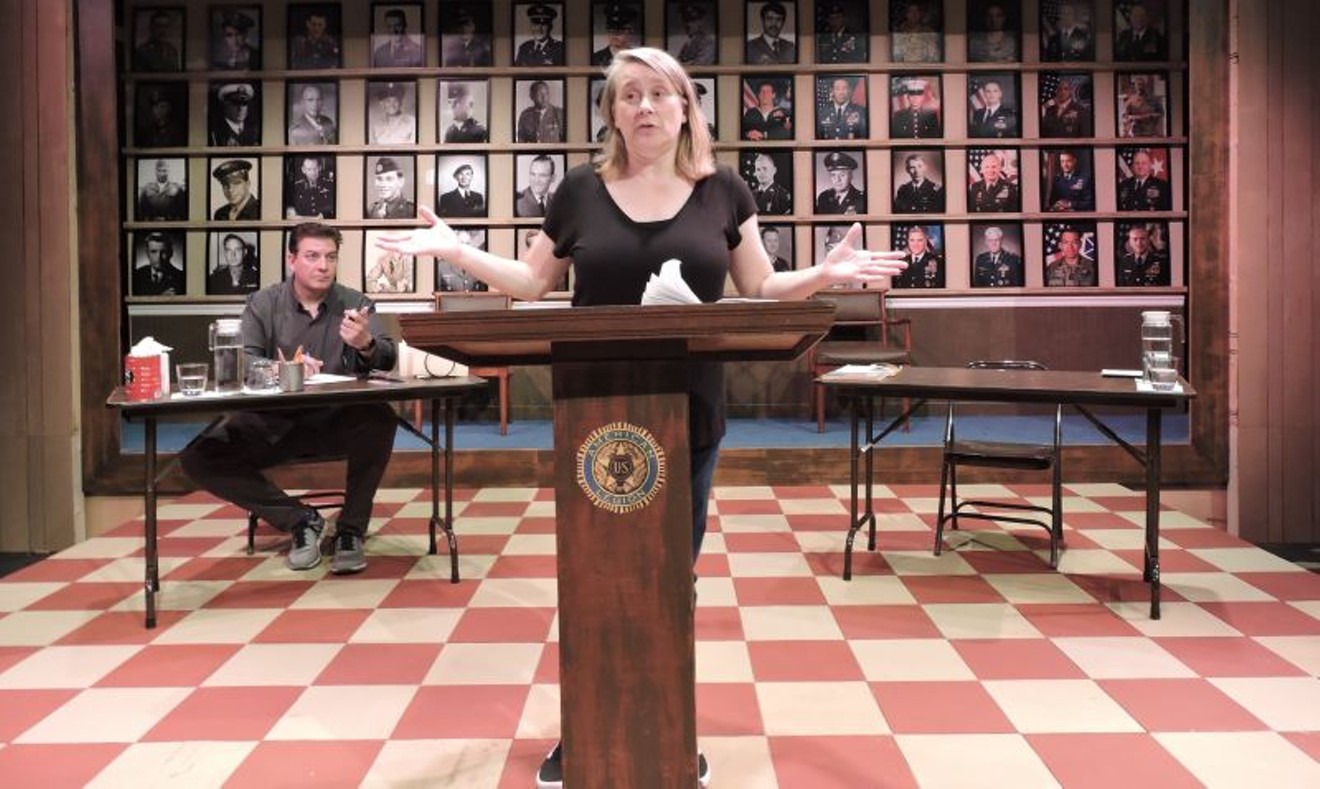Support Us
Houston's independent source of
local news and culture
account
- Welcome,
Insider - Login
- My Account
- My Newsletters
- Contribute
- Contact Us
- Sign out
What The Constitution Means to Me — and American Women in General — at Main Street Theater
Margaret Downing September 6, 2023 4:30AM

Shannon Emerick as Heidi (foreground) as Sean Patrick Judge keeps time in
Photo by Anna Galan
[
{
"name": "Related Stories / Support Us Combo",
"component": "11591218",
"insertPoint": "4",
"requiredCountToDisplay": "4"
},{
"name": "Air - Billboard - Inline Content",
"component": "11591214",
"insertPoint": "2/3",
"requiredCountToDisplay": "7"
},{
"name": "R1 - Beta - Mobile Only",
"component": "12287027",
"insertPoint": "8",
"requiredCountToDisplay": "8"
},{
"name": "Air - MediumRectangle - Inline Content - Mobile Display Size 2",
"component": "11591215",
"insertPoint": "12",
"requiredCountToDisplay": "12"
},{
"name": "Air - MediumRectangle - Inline Content - Mobile Display Size 2",
"component": "11591215",
"insertPoint": "4th",
"startingPoint": "16",
"requiredCountToDisplay": "12"
}
]
Probably the first surprise in the one act play What the Constitution Means to Me is that a high school student could earn a fairly significant amount of money by traveling from one American Legion post to another and making a presentation extolling the virtues of that document.
After that, it's how a middle-aged, more experienced woman both questions some of the things she compartmentalized when her teenage self was competing in Constitutional debates — with some degree of humor — and still has respect for what the country's founders came up with when they wrote it.
Shannon Emerick (Mother of the Maid, Permanent Collection, Silent Sky, The Coast of Utopia, The Revolutionists) takes on the lead role of Heidi in Main Street Theater's regional premiere of the 2019 Pulitzer finalist play by Heidi Schreck.
She also plays her younger self at 15. The role of Debater is played by Elizabeth Barnes (Joan of Arc in Mother of the Maid) while Seán Patrick Judge (The Coast of Utopia, Richard III, Time Stands Still), performs the role of The Legionnaire. Sophia Watt (The Oldest Boy) directs.
The play is based on Schreck's real life experience in the late 1980s when she earned her college tuition beginning at age 15 by competing in these debates. In her look back at her younger self she examines the impact the constitution has had on women and their bodies and what it will do in the future.
"If anything, it is possibly more timely now than when it was published," Emerick says. "It's about a lot of women's rights issues, not just reproductive health but domestic violence and other things women face in the world but it's done in this really unique way. It's hilarious at points; it's devastating at points."
"It's not a constitution bashing play at all, which is why I think that it works," stresses Emerick. "[That] would just alienate too many people. It has a lot of respect for the document and how the document was created, but also acknowledges it’s pretty old and it's not protecting everybody in America. It didn't really do that from the beginning, but that was the intent."
And there's an actual debate at the end of the play, Emerick says. "The first hour is all about Heidi and the women in her family and the impact of the Constitution on citizens of the United States from the beginning to today."
Ultimately the Heidi character drops the facade, explaining to everyone in the audience what's about to happen. "You're going to be my audience from the American Legion Hall. Then she tells the last half of Part one completely as herself and goes into some tough stuff about being a woman in this country and what that meant to her great-great-grandmother and what that means for women today."
"Part Two is where we do an actual debate in front of the audience. We have an actual high schooler [Barnes who just graduated from high school]who has come and is rehearsing this debate with us and the debate is whether we should keep or abolish the Constitution. That's in real time. We flip a coin to see who's going to take which side of the argument.
"She’s really looking back. She was thinking about the Constitution several years ago and was like "Why did I love that so much when I was 15? What was it that really moved me?' She called her mom and her mom had thrown the speech away. So she decides to reconstruct it about what she can remember about herself at 15. And so she goes back and of course she sees things that now, as an adult, she's like 'I can't believe I said that,' But she also sees the passion for doing what's right was there from the very beginning and the passion for treating people equally was there from the beginning," Emerick says. .
"When she was 15 that's when she learned about the abuse that had gone on in her family in her mom's generation and further back but at 15 she could not deal with that. And when she was 21 she ended up having an abortion and she knew she was doing something totally legal but she really couldn't deal with that either so she really put things away. When she started to delve into these issues when she was in her mid-40s she wrote this play and started exploring them through this lens."
And although they include the typical celebrity crushes a 15-year-old would have, the play definitely respects the teen Heidi.
"One of the things we’re really discovering we certainly don’t want to undercut the depth of the 15 year-old. She’s still at her core the same person and she was a very smart 15-year-old and she did know when there was injustice in the world. At the same time she was a big believer in this document that really did do some extremely radical things that had never been done in the world before."
Performances are scheduled for September 16 through October 15 (previews September 10, 14, 15) at 7:30 p.m. Thursdays through Saturdays and 3 p.m. Sundays. Pride Night: October 5 at 6 p.m. at Main Street Theatre- Rice Village, 2540 Times Boulevard. $39-$59.
KEEP THE HOUSTON PRESS FREE...
Since we started the Houston Press, it has been defined as the free, independent voice of Houston, and we'd like to keep it that way. With local media under siege, it's more important than ever for us to rally support behind funding our local journalism. You can help by participating in our "I Support" program, allowing us to keep offering readers access to our incisive coverage of local news, food and culture with no paywalls.
Margaret Downing is the editor-in-chief who oversees the Houston Press newsroom and its online publication. She frequently writes on a wide range of subjects.
Contact:
Margaret Downing
Follow:
Facebook:
HoustonPress
Twitter:
@HoustonPress
Trending Arts & Culture
- Kinetic Ensemble's Finale Blends Music, Dance
- The 10 Best And Most Controversial Hustler Magazine Covers Ever (NSFW)
- Top 5 Sickest Stephen King Sex Scenes (NSFW)
-
Sponsored Content From: [%sponsoredBy%]
[%title%]

Don't Miss Out
SIGN UP for the latest
arts & culture
news, free stuff and more!
Become a member to support the independent voice of Houston
and help keep the future of the Houston Press FREE
Use of this website constitutes acceptance of our
terms of use,
our cookies policy, and our
privacy policy
The Houston Press may earn a portion of sales from products & services purchased through links on our site from our
affiliate partners.
©2024
Houston Press, LP. All rights reserved.





